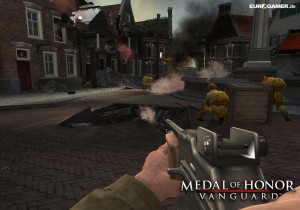Much of the time when advocates argue for the benefits of learning from games they are discussing educational games – those games built with specific teaching goals in mind. But a new research report finds that action games may help as well, encouraging learning that can aid students in math, science and technology.
The seven researchers conducted a meta-analysis of 217 previous studies in order to examine the larger issue of training children and adults to improve their spatial skills.
“These skills are important for a variety of everyday tasks, including tool use and navigation,” the authors wrote in Psychological Bulletin. “They also relate to an important national problem: effective education in the science, technology, engineering, and mathematics (STEM) disciplines. Recent analyses have shown that spatial abilities uniquely predict STEM achievement and attainment.”
Key Findings
- Spatial skills can be improved dramatically through training and that training is “effective, durable, and transferable.”
- Playing “active games has the potential to enhance spatial thinking substantially, even when compared to a strong control group.”
- Improving spatial thinking can improve students’ ability to perform well in so-called STEM efforts.
The analysis covers much more than video games, but in all of the cases they studied, the researchers found spatial skills to be something that both men and women responded to – both in classroom-style learning and in other forms like games.
Specifically, the analysis examined three different studies that explored the effect of games. The result, the authors wrote, “highlight the relevance of video games for improving spatial skills.”
In particular, they pointed to one 2007 study that focused on two groups of people, one group played Medal of Honor for 10 hours over four weeks, the other played a non-action game – the puzzle game Balance. The results found that the action game had a much more significant impact on spatial thinking than the non-active game.
The importance of improving these skills runs throughout the research, but the results speak to how important game-play may be.
“Even a small amount of training [which could include video games] can improve spatial reasoning in both males and females, and children and adults. Spatial training programs therefore may play a particularly important role in the education and enhancement of spatial skills and mathematics and science more generally.”

